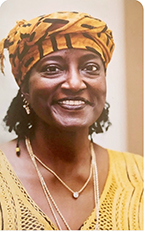By Staff Writer
Ernestine Augusta Ray, a prominent historian and educator in Fort Lauderdale, passed away on May 18, 2024, at 72. Her death has deeply affected the community, where she was known for her dedication to empowering others and involving youth in various initiatives.
Ray was a tireless advocate for African American history and culture, significantly transforming the Old Dillard Museum as its curator. Her work at the museum showcased the richness of African American culture and educated the community on preserving history.
Beyond the museum, Ray founded Ancestral Rays and Ancestral Legacies, organizations dedicated to cultural awareness and youth empowerment. She provided platforms for young people to learn about their heritage and develop pride in their cultural identity. Her work in these organizations and various community initiatives highlighted her commitment to education and helping youth reach their potential.
Ray’s passing has been met with numerous tributes. Those who knew her remember her as passionate and dedicated. Patricia West, the former deputy director of human services for Broward County, and a very influential supporter of the old Dillard museum, had this to say about Ray’s dedication and her inner and outward beauty. “Earnestine was Royalty. She was completely dedicated to ensuring that our community had the highest quality of history relevant to our community. Her beautiful African Attire and her beautiful smile made her look like a Queen. She created exhibits in the museum that continue to inspire to this day. She was a treasure and I am so much better for having had the opportunity to work with her and learn from her.” Despite being diagnosed with a learning disability early in life, Ray earned multiple degrees and achieved great success, inspiring many with her resilience.
Ray’s legacy is a testament to the power of community empowerment and youth involvement. As the community mourns her loss, her life’s work will continue to inspire future generations to embrace their heritage and strive for excellence.
Derek Davis, who succeeded Ray as the curator of the old Dillard Museum had this to say about his mentor.
“In addition to being a beautiful, peaceful person, Ernistine was an insightful, artistic, and dynamic community and cultural advocate. She was always dressed in eloquent Afro-centric attire that draped her figure with flowing, colorful patterns, and accented her warming, embracing smile.
The programs, exhibits, and history-based initiatives she managed also reflected the excellence of her lifestyle. Her programs included jazz concerts by local and internationally known musicians. She organized cultural workshops on breading, quilting, jewelry making, gourds, and other often underappreciated folk crafts from Black heritage. She produced stage presentations for spoken word artists, actors, poets, and storytellers.
As curator for the Old Dillard Museum, Ernestine acquired the funding for dozens of exhibits, including the three permanent exhibits that still stand at the facility. Her first exhibit at the museum, known as the “Heritage Room” highlighted the collection of materials that were used to save the facility and put it on the National Register of Historic Places. “The Jazz Room” and the “Mind On, Hands On” room also were funded and installed under her leadership.
To top off everything else she did, Ernestine oversaw a robust oral history collection program for Blacks in Fort Lauderdale. One of the crowning glories of her oral history projects was the publication of “My Soul Is a Witness’ that was written by Debra Works. She also helped produce “The Legacy Continues” video with the Broward County Library and Blockbuster Films.
I always found her to be a compassionate, and faithful friend to me and the Broward County community. As the name of one of her companies implied, she now has become an “Ancestral Legacy” to be remembered and honored by future generations. Well done sister, well done.”

